Lennart and Daniel Kopra Memorial Endowed Presidential Scholarship in Classical Guitar or Music Education
Marty Kopra chose to honor her husband and son with the Lennart and Daniel Kopra Memorial Endowed Presidential Scholarship in Classical Guitar or Music Education because both men immersed themselves in music. Through this endowment, Marty hopes to encourage talented musicians to continue their musical studies and enrich the University community with their performances.
Marty and Lennart Kopra moved to Austin in August 1954, Lennart with a new PhD and a UT academic appointment as assistant professor of speech. The University hired Lennart to develop the audiology program in the Speech and Hearing Clinic. Len assured Marty that they could move if she did not like Texas. They stayed, had four children and Lennart thrived at the University. Len died in 1998; on 5 October 2001 Marty married Thomas Gretzinger, M.D. In 1976, after their children were in school, Marty earned a MEd in rehabilitation counseling from the University. From 1981 to 1987, she worked as a research associate in the Department of Speech Communication. Daniel, Marty’s second son, graduated from the University in 1979 with a BA degree in languages.
Lennart’s original academic major was music. He enjoyed playing his own compositions on the piano. Daniel played piano and guitar and his original major was also music. Len and Dan also played in their high school bands. Len played trumpet. Dan played trumpet and then the baritone horn. In addition, Marty, as well as her other three children, played instruments, all benefiting from band experience in public schools.
Dan started playing guitar on an instrument that was loaned to him when he was twelve. Shortly after that he began cutting lawns, babysitting, and working odd summer jobs so he could save up and buy his own guitar. In 1974, when he was 17 years old, he contracted to have a custom guitar made. The instrument was delivered in 1976 and cost Dan $440. Marty’s father, Charles Martin Witthoft, was a Lutheran minister who started a band and recruited band members from the community of every church where he was pastor. He bought beat-up instruments at second-hand stores, repaired them, and taught children to play them.
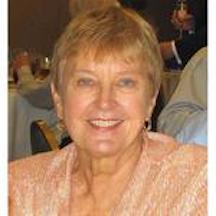
Martha (Marty) Witthoft Kopra
Pastor Witthoft organized summer concerts, marched his band in parades, and played functions at different churches. All of his six children played an instrument and played in high school bands. Four of his children continued to play in college bands. Until the family’s older siblings left for college, the family would play at nursing homes and other small venues. The oldest brother, Herman Witthoft, followed in his father’s musical footsteps and organized a German oompah band that featured his three daughters as singers. The band played summer German festivals in the Catskill Mountains in upstate New York. Herman also directed the local fireman’s band in Ghent, New York, a small town south of Albany, New York.
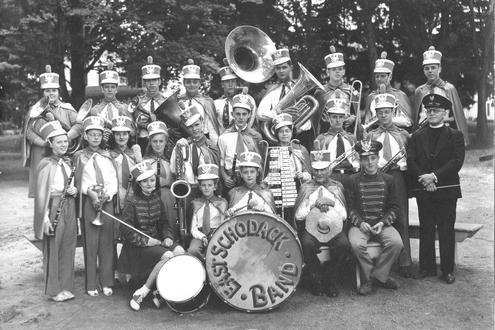
Pastor Witthoft formed a band in every church where he served. He recuited band members from the community, taught kids to play, and loaned or gave them instuments. East Schodack is a small community south of Albany, New York (1945).
Dr. Lennart L. Kopra
Dr. Kopra was a professor emeritus at The University of Texas at Austin, where he taught in the College of Communication from 1954 until his retirement in 1985. He developed the audiology program in the Department of Speech, the first academic program in audiology in Texas. Dr. Kopra was director of the University’s Speech and Hearing Clinic from 1961 to 1972. Throughout his teaching career, Dr. Kopra researched and wrote extensively on a variety of subjects, including the effects of noise on hearing, hearing and the aging, and the use of videodisk technologies with lip-reading research and training. He was active in many professional organizations. Dr. Kopra graduated from Butte High School in Butte, Montana in 1942. For two months he worked as an apprentice in a mine drilling holes and filling them with dynamite. The next shift would do the blasting, and Dr. Kopra described the mine as a “hell hole.” He attended Suomi College in Hancock, Michigan, in the fall of 1942, before he was drafted into World War II on April 5, 1943, and sent to Kearns, Utah, for basic training. Crawling under barbed wire and sniffing phosgene and mustard gas didn’t appeal to him, so he applied for aviation cadet training while at Kearns. His first assignment was Deming Air Force Base, New Mexico, where he flew bombardier cadets in the AT-11 Beechcraft on practice bombing runs over desolate unpopulated areas of New Mexico.
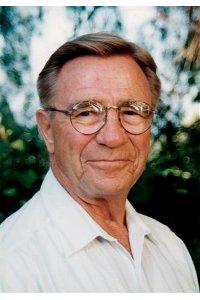
Dr. Lennart L. Kopra, May 1996
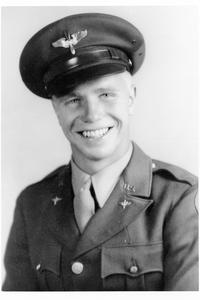
By October 1944, Dr. Kopra was stationed at Bergstrom Air Force Base in Austin, Texas, for C-47 and C-46 transition training. When his unit was deployed to the European front, Dr. Kopra was hospitalized with tonsillitis for a week, then was released and trained to fly the Curtis Commando C-46, and sent to Burma. He served as a US Army Corps pilot and aircraft commander in Burma, where he transported gasoline and other supplies over the Himalayan Mountains, a perilous flight referred to as flying “the Hump.” After the war he was stationed in China and flew missions and personnel throughout the country. One particularly memorable experience happened on January 11, 1946. Dr. Kopra was assigned to fly a mission from Shanghai to Yan’an, China, the communist capital. He wrote the name of the man he was supposed to meet, Mao Tse Tung, in his address book, and next to that, the man’s title “Chairman,” but Dr. Kopra wondered, “The chairman of what?” Before he had an audience with Chairman Mao, Dr. Kopra was told not to speak of military matters, political matters, or religious matters, and if he were asked to dance, he was to dance. He went through a receiving line, and afterwards a woman wearing a quilted Chinese dress gestured for him to dance, so he danced with her to the Chinese music. The next day, his 22nd birthday, he was taken pheasant hunting.
Len was discharged in May of 1946. He continued his service in the US Air Force Reserves and retired as a lieutenant colonel in 1972. He was a member of the Longhorn Chapter (Basha) of the China-India-Burma veterans’ organization, the Texas Retired Officers Association, and the Hump Pilots Association.
Dr. Kopra was born in Virginia, Minnesota, on January 12, 1924, to Finnish immigrant parents; Finnish was his first language. In 1994-95, Lennart and Marty lived in Finland for 13 months, where they researched his Finnish roots and visited with family members. Lennart Lauri Kopra died December 8, 1998.
Len was very proud of his Finnish heritage. He and Marty named their daughter after her Dad’s middle name, Lauri. Lauri is a male name in Finland, pronounced Low(as in how)ri in Finnish.She never had trouble with her name in the United States but one summer when the family was together in Helsinki, Lauri tried to use her credit card at Stockmann’s, a large department store. They would not accept her credit card because of the “male” name on her card. She explained, “I was named after my father… Lauri is a girl’s name in America.” The clerk called the supervisor. Finally, the supervisor let the charge go through.
Mr. Daniel A. Kopra
Born in Austin, Texas, February 26, 1957, Daniel Kopra became an Eagle Scout and was initiated into the Order of the Arrow before graduating from McCallum High School in Austin. He earned a Bachelor of Arts degree from The University of Texas at Austin in 1979 and a Doctor of Jurisprudence in 1986 from St. Mary’s University in San Antonio. Dan moved to El Paso in 1987 to become an assistant attorney general and in 1989 began service as an assistant district attorney. In 1996, he joined the Public Defender’s Office. Dan was a member of the Texas State Bar and a leader for the Eckankar group in El Paso. Dan died June 11, 2005, while cycling with friends in Canutillo (near El Paso).
Throughout his life, Dan found joy in the outdoors and music. He developed a love for the water at an early age and was an avid swimmer and scuba diver. He frequently went to Balmorhea to scuba dive and had recently taken his first extended diving trip in the Bahamas with friends. Family and friends often enjoyed listening to Dan play piano and guitar; this was a source of great happiness to him.
From Timothy Kopra (spoken at his brother Danny’s memorial service): ” When I was around 6 and Danny was in 6th grade, he was fascinated with the space program and built models of the Saturn 5 rocket, the command and service module, and the lunar module. Since Danny persuaded Mom and Dad how important it was to see one of the moon landings on TV at 2 o’clock in the morning, Danny and I stayed up watching news clips, listening to Walter Cronkite, and waiting for the landing. I really thought it was special that I could stay up so late, especially with my big brother.
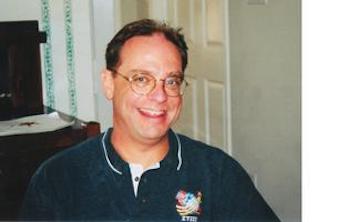
Daniel Kopra, December 2002
When Danny was a little older, our family went to pick him up from a particularly challenging Boy Scout event where they blindfolded him, took him out into the woods, and then let him navigate his way back. I remember that mom was a little indignant about all this, but I thought it was cool. Danny was excited and clearly proud he had done well. I was very proud of him, too.When Danny was a teenager, we moved to a smaller home in the country. We all took piano lessons, but Danny was the one who really shined.
He played some pieces by George Gershwin and Scott Joplin so many times that I still remember what books I was reading and where I was playing in the house. So once we were all grown up and I was married, Dawn and I with our two children, I could see the same patience that he had shown his little brother waiting for the moon landing, as he would sit on our couch reading to his young niece and nephew. Matthew, in particular, would bring a foot-high stack of books and plop himself on Uncle Dan’s lap. Danny would share his adventures about his new-found love for scuba diving or cycling with friends with the same passion as a soon-to-be Eagle Scout after passing his land navigation test. And when Danny would visit, he would fill our house with music just like when I was a kid.”
From Andy Kopra (spoken at his brother Danny’s memorial service)
“When my brother Danny and I were little, we were obsessed with the television program Sea Hunt. In it, Lloyd Bridges would swim around in scuba gear, fight crime, and generally perform heroic deeds. Long technical discussions followed our faithful study of the program about how Seahunt (as we called him) could talk underwater, since all the action was described in voiceover.
We finally settled on the possibility of a microphone in his diving mask. Besides providing a source of endless technological speculation, the adventures of our hero Seahunt also structured our play, and a favorite game was called “Seahunt and Superman.” I would be Superman, tying a diaper around my neck, and with arms outstretched run around the living room, my cape fluttering majestically behind me. Danny was Seahunt, thanks to some underwear he wore over his head, looking out one of the leg holes for his diving mask. I’ve never been able to fly (I left that to Tim), but the first time at the pool that next summer Danny just jumped in, and suddenly he could swim.
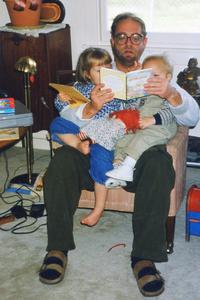
Dan reading to his niece and nephew, November 1998.
This is what Danny did: he jumped in, and he did things, and often things that other people just wouldn’t do. I asked him once what percentage of the people he represented as a public defender he thought were guilty. He looked thoughtfully in the air for a moment, and then with an attitude of exaggerated reasonableness said, “Oh, about 95 percent.” Perhaps his colleagues can refine this figure (or tell me if he was teasing), but I have to believe that if I thought that 19 out of 20 times I would be working against the odds, I don’t know how cheerfully I would continue to work.
This is, after all, someone who learned how to scuba dive in the desert, and a man for whom faithful service to other people, and to the ideals that bind us together as an ethical society, defined the evolving structure of his life. And this is not an abstraction: the affection of his colleagues — other lawyers, a remarkably devoted and caring staff — is proof of this service at the simplest scale, of individuals with common goals who care about each other.”
How to Give
Learn more at giving.utexas.edu
Search Endowments
Look for inspiring stories
